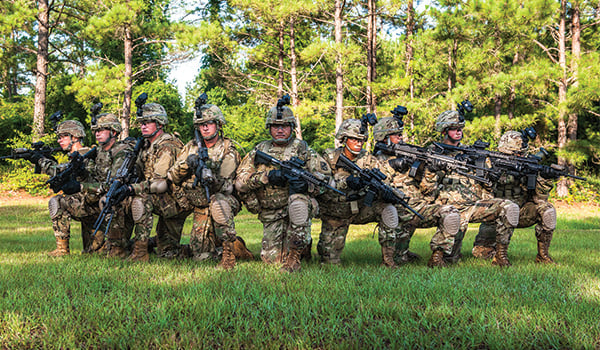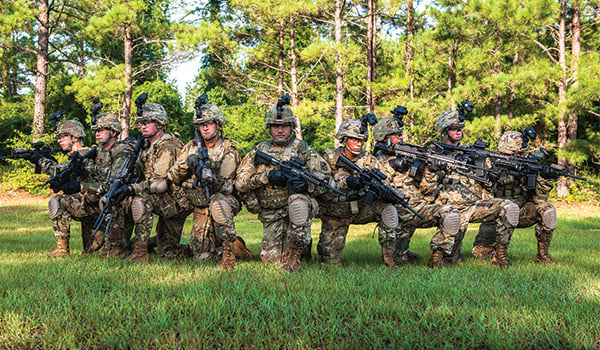
Command Sergeant Major / By CSM Gregory M. Chambers: Is your platoon, company, battalion prepared to operate in large scale combat operations (LSCO)? Is your unit prepared to operate in a decentralized environment in a mixed team of Aviation platforms that is directly or indirectly embedded with our ground force maneuver elements? Is your current training plan focused on LSCO?

Soldiers from the 198th Infantry Regiment at Fort Benning, GA. / U.S. ARMY PHOTO BY PATRICK A. ALBRIGHT
As our doctrine evolves there is one thing that will be constant, we must be embedded with our ground force maneuver elements. We must synchronize with them and understand their doctrinal terms if we are going to be successful. As MG William Gayler told several Aviation leaders recently, “We have got to get dirty.”
Changing the Training Culture
In order to support our Ground Force and LSCO our strategy needs to change on how we execute Aviation operations, specifically as it pertains to enlisted roles and responsibilities. One significant “subjective” thing must change and that’s our “culture.” Our training culture needs to change in order to support complex, difficult and challenging mission sets that will be part of LSCO in the future. We have become reliant over the past 16 years on resources that will not be available in the future. You will go to the fight with what you own, that is, what your MTOE authorizes you to have. Understand what that really means and how to employ it to be effective.
But, let’s discuss what is going to help units survive in a tactical environment and that’s tough, realistic and repetitive training. The bare minimum or “that’s good enough” isn’t going to hold up in the crucible of combat. Our ground force expects us to move and destroy the enemy with them. Our culture of training and how we train impacts how we will operate in combat. Training must have a “tactical” focus. Individual MOS training instructs the “technical” side of training, but we must know how to employ our technical skills into tactical skills.
Tactical training can’t start until you understand as a leader what experience you have inside your formation, how to manage that experience and how to employ that experience. Tactical training starts with training management, knowing “who” in your formation needs the resources to build tactical experience and what resources you need to build that experience. Several examples are, building aircraft crewmember standardization instructors (N1s), downed aircraft recovery teams (DART), door gunnery operations, hoist operations, forward area refueling point (FARP) operations, nonrated crewmember progressions and maintenance teams. Simply executing door gunnery tables is not enough to make a Soldier tactically proficient. They may be trained, but effective employment in a combat environment takes a lot more repetitions and those repetitions do not have to be on a live fire range. As you grow tactical experience units have to manage the assembly of “teams” in order to accomplish tactical tasks, we all know the benefits and the synergy a good flight crew has once they have flown together for a while. We need to do the same thing in our tactical operation centers, our FARP Teams, maintenance teams, DARTs or our logistic teams.
Competition
The one thing that drives a conducive training environment is competition. Units that thrive on healthy competitions are units that set themselves apart from others. Competitive units build strong cohesive teams that in the end will crush their opponents. When the standard is a standard of excellence instead of a standard of just trained, Soldiers will want to be part of your unit. There are numerous events or SOPs that units can put in place to build a culture of competiveness. Whether it’s physical training or marksmanship, door gunnery or phase completion rates, or Soldier/NCO boards, competition will change the training culture.
To quote General George Patton Jr, “A pint of sweat will save a gallon of blood.” A tough training culture will produce a lot of sweat which will better prepare us for combat and make our Branch highly successful with our ground force partners in large scale combat operations. Tough and realistic training is the key to tactical combat victories in the future.
“Above the Best!”
“This We’ll Defend!”
CSM Chambers
This email address is being protected from spambots. You need JavaScript enabled to view it.
CSM Gregory M. Chambers is the command sergeant major of the Aviation Branch and the U.S. Army Aviation Center of Excellence, Fort Rucker, AL.








